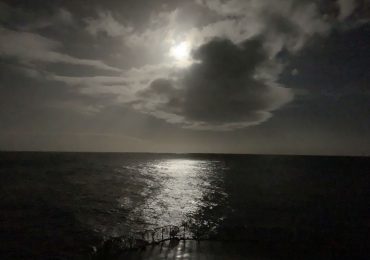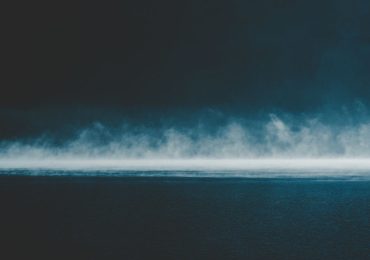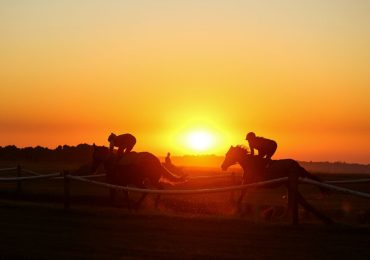The JRB presents an exclusive excerpt from a novel in progress by Damon Galgut.
By the time the sun goes down, especially vividly out here, all the visitors have gone and only the family is left. Oom Ockie is by now listing a little to the right, weighted perhaps by his uneven smile, hitched up only at one end. He and Pa sit in the lounge, watching the news on the TV, which bears bad tidings from all over the country. A limpet mine in Johannesburg, troops in the townships. Every now and then Pa breaks down and sobs for a while, as if he’s moved by the state of South Africa. Ockie just sips and smiles.
In the kitchen, Marina supervises the black girl, who has a pile of plates and cups to wash. The way she drags herself around, so heavy and slow, you’d think she’s the one who’s lost a family member. Unforgivable to be lazy on a big day like this, she has to be pushed along like a boulder, it’s exhausting giving orders all the time. Crossly, Marina does a last march through the house, looking for leftovers. In the dining room she encounters Amor, whom she hasn’t had a chance to chastise yet. Where did you run off to? she demands, more angry than she knew, and finds herself pinching her niece on the upper arm, a flash of genuine cruelty in her fingernails.
Ow, Amor says, but doesn’t otherwise answer, and Marina stomps on with disgruntled satisfaction up to the second floor. She goes into Caroline’s room and hesitates for a moment before closing the windows and curtains. It seems to her there is a faint tincture, an odour, on the air. Outside, it is night.
It is night, the same night, but later, the stars have moved on. Only a cuticle of moon, casting the faintest metallic glow onto this landscape of rocks and hills, making it look almost liquid, a mercurial sea. The line of the main road is stitched out now and then in slow motion by the headlamps of a car, carrying its cargo of human lives, going from somewhere to somewhere.
The house is dark, except for floodlights fore and aft, note the nautical terms, illuminating the driveway and the lawn, and a single lamp left on inside, in the lounge. In the various rooms downstairs everything is mostly inert, except for the occasional scuttling insect, or is it a rodent, and the tiny expansions and contractions of the furniture. Pitter, patter, creak, crack.
But upstairs, in the bedrooms, there is a flickering going on. Pa’s mattress is a raft, tossing on a current of uneasy dreams. He has taken a sedative prescribed by Dr Raaff, and it keeps his head just under the surface, looking at images refracted from above. His wife is in many of them, but altered somehow, a bit squiff. A trace in her of another person altogether, someone he doesn’t know. How can this be, he cries to her, you’re dead. That’s an unforgivable thing to say, Manie, she tells him, I’m very hurt. His heart is wrung like an old rag. I’m sorry, I’m sorry.
Through the wall beside him, just an outstretched arm away, Astrid ripples in her sleep. She has recently lost her virginity, to a boy she met at the ice-rink, and sex flows through her like a golden wind. She has forgotten the pain, though it’s part of the shimmer around the faces of young men, with their bristly beards, and in this dream around the face of Dean de Wet in particular, whose mouth is a pink colour it doesn’t have in waking life, thrilling her deep inside, down where everything meets.
In the guest bedroom, Tannie Marina dozes and starts, dozes and starts. She achieves only the beginning of a dream, in which she’s on a picnic with PW Botha at an old fort somewhere, and he’s feeding her strawberries with thick white fingers, before she gets woken by a kick. At home in Faerie Glen she doesn’t share a bed with Ockie, who lies twitching beside her like a hit-and-run victim, waiting for medical assistance. What a thought, Marina, sis on you, but you can’t help what you think, it’s only human, and far worse has gone through your mind, oh yes it has. Her husband’s foot touches hers, she pulls her foot away. Terrible to flinch from what you once, briefly, loved, or thought you did, or wanted to think you did. But are shackled to, regardless, for life.
At the other end of the chain, Ockie jerks like a dancing bear. He doesn’t dream, not exactly, unless the shallows he splashes through are a sort of dream, but nothing quite happens, there is just the question of colour changing all the time. A bubble rises from the sea-bed, becomes a breaking of wind against the flank of his wife, who stiffens and flares her nostrils in protest.
And in her bedroom at the end of the passage, Amor lies sleepless, hour after hour. Not unusual for her, believe me, every night before she drifts off her mind must move outward from where her body is based, on its back in bed, to reach out and touch certain objects in particular places, in a specific order. Only when she’s done that can she relax enough to let go. But tonight it doesn’t work, other images from the day are too powerful, they come jostling in, Miss Starkey’s pressed-together lips, Lukas’ stick hitting the ground, the sore place on her arm where her aunt pinched her, so much rage in her fingers, sending out its little pulse of pain into the universe, notice me, I am here, Amor Swart, 1986. May tomorrow never come.
- Damon Galgut is the award-winning author of several novels, a collection of short stories and a number of plays. His novels have won the 1991 CNA award, the 2004 Commonwealth Writers’ Prize (Africa Region) and the 2008 University of Johannesburg Prize. He has twice been shortlisted for the Man Booker Prize, for The Good Doctor (2003) and In a Strange Room (2010). His most recent novel, Arctic Summer, was published in 2014 and won the Sunday Times Barry Ronge Fiction Prize.
© Damon Galgut, 2017





